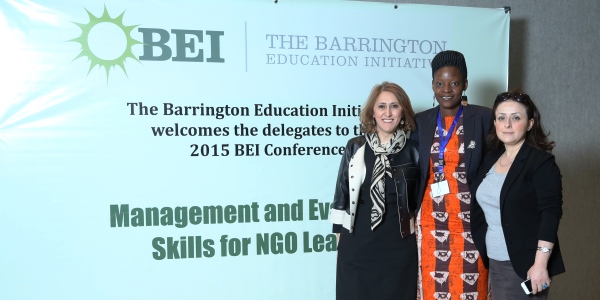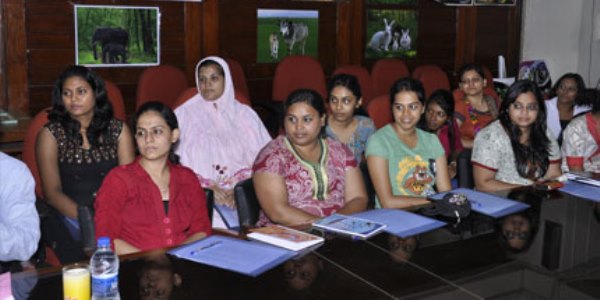Author Archives: BEI
BEI Annual Conference 2015 – Baku
 The BEI conference took place in April 2015 in Baku Azerbaijan.
The BEI conference took place in April 2015 in Baku Azerbaijan.
Nearly 50 participants coming from Azerbaijan, Georgia, India, Jordan, Kenya, Uganda and Spain met in Baku. Most of them (42) were delegates from the organizations we collaborate with.
Under the title “Management and Evaluation Skills for NGO’s” the first and second day of sessions were focused on developing results-based strategies and evaluating their impact and performance. The participants found the content very relevant and helpful and enjoyed the interactive sessions which were expertly delivered by the RITSAR team of trainers headed by Calvin Tiessen.
Conlusions and challenges.
One of biggest challenge that NGO’s face is fundrising. BEI is considering including this topic in the next conference.
BEI considers collaboration and synergy between our partner organization an important tool in improving the performance of each organization. That is why we are supporting the Teacher Training Programs that are being developed by Prof. Reeta Sonawat from SNDT in India and our three Kenyan partners Pole’Pole’ Watoto and YoungLife Africa and training conducted last year in Mumbai for the workers of SAHYOG by Katha from Delhi.
We urge all our partners to communicated with each other and find ways of collaborating to the mutual benefit of all.
The annual BEI Conference will take place in Baku in April 2015
Once a year, BEI meets with the delegates from the organizations we cooperate with. The upcoming meeting is going to be held in Azerbaijan from the 13th to the 17th of April. The event will combine training sessions for the delegates with reports regarding the activities of their organizations during 2014. There will be also time for networking and tourism. Baku will be the city and “Management and Evaluation Skills for NGO’s” the subject of the 2015 BEI Education Conference.
NGO operations are about change – change in people, communities and environments. As such, measuring success demands effective identification of those who have the most interest in the operations of the NGO – the stakeholders. This is the reason why the first day of sessions will focus on developing results-based strategies, because the foundation of results-based strategies development is a robust understanding of stakeholders.
The second day of sessions will focus on evaluating impact and performance with reference to results-based plans, that requires the identification of meaningful indicators of success. Participants will look at a set of principles for drafting effective indicators for each part of a results chain. Then they will draft a set of indicators for their own results-based plans. Participants will also look at seven principles for Financial Management in NGO settings: Consistency, Accountability, Transparency, Viability, integrity, Stewardship and Accounting Standards. They will assess their current practices with reference to these principles and take away an action plan to address needs for change that become apparent.
During the third day of the meetings, delegates will have the opportunity to present short reports regarding the activities of their organizations during 2014.
BEI Annual Conference 2013
Conference Subject: Education of Children in Underprivileged Communities
The conference took place in the Kempinsky hotel, Amman, Jordan from the 17th – 22nd November 2013.
The hosts were the King Hussein Foundation
The conference was attended by delegates from 13 organizations supported by BEI.
The King Hussein Foundation including:
The Jubilee School – Amman, Jordan
The Community Development Program – Amman, Jordan
JOHUD – The Jordanian Organization for Human Development
SNDT – Women’s University – Mumbai, India
SAHYOG – The Chehak Trust – Mumbai, India
KATHA – New Delhi, India
SIP – School Improvement Program – Udang, India
SOS CV – Baku, Azerbaijan
SOS CV – Belarus
YoungLife Africa – Orphanage, Ruiru, Kenya
Pole’Pole’ – Malindi, Kenya
Watoto – Malindi, Kenya
ADI – The African Dreams Initiative, Kampala, Uganda
BSUF – Buyemba Subira Uganda Fund, Butansi Village, Uganda
BEI Conference program:
Day 1: 17th Nov. Participants arrivals and Welcome cocktails
Day 2: Inauguration and presentations of all participating organizations
Day 3: 4 plenary sessions
Day 4: Trip to the ancient Roman city of Jerash and the church of Madaba with lunch in a traditional Jordanian restaurant in Madaba village.
Day 5: Departures day.
International Symposium 2012
In May 2012 The Barrington Education Initiative sponsored the first “International Symposium on Teacher Enrichment” held at the SNDT Woman’s University in Mumbai, India. BEI has always believed that sharing knowledge and learning from the experience of other professionals ultimately leads to the growth and development of all concerned. This belief served as the base for initiating a dialog between leading professionals from two of our projects, one from Mumbai, India, the other from Amman, Jordan.
The dialog was hosted in Mumbai by the Head of the Department of Human Development and Dean of the Faculty of Home Sciences and SNDT Women;s University, Mumbai and took place in May 2012. The dialog took place with a delegation from the Queen Zein Al-Sharaf Institute for Development in Amman, Jordan (ZENID), headed the Director of the Early Childhood Disability program, together Directors of BEI Switzerland.
The symposium dealt with an array of issues all dealing with various aspects of the Best Practices in Early Childhood Education. This was presented on the one hand by the academics of the university and on the other hand, by he applied side of these practices, as implemented daily in the EC Childhood programs in Jordan and EC programs in Mumbai.
Some of the areas, amongst others, enthusiastically presented and discussed dealt with subjects such as the Implementation of Different Teaching Strategies, Quality in Pre-Schools – the Perception of the Teachers, Supervisors and Principals, the Relationship between Effective Performance Factors and Teacher Retention and a presentation on Infant Stimulation – A Multiple Intelligence Perspective.
The results were extremely rewarding as all of the participants acknowledged their gains by being exposed to different professional approaches and ideas together with the pre-schools, the teachers, the parents, all who want the best for the children.



